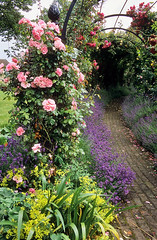| Climbing roses. (Photo credit: ukgardenphotos) |
This may be bad news if you were imagining your garden full of long-stemmed tea roses with huge blooms, but if you think about it, it makes a lot of sense to go for the older varieties. Just like pedigree animals, if plants are selectively bred for their appearance they can start to have weaknesses. The principle of an organic garden is to take a step back from our human desire to control nature to that extent.
Besides, the smaller flowers can be beautiful too, especially if you deadhead them regularly so that flowers keep on coming.
Assuming that you have chosen your roses, let's now consider how to grow roses organically when those darn pests appear. First, it is better to plant your rose bushes in different places around the garden instead of having a dedicated rose garden where they are all together. This can prevent diseases such as black spot from spreading from one plant to the next.
Another important part of disease prevention when you are considering how to grow roses is the method of pruning. It is very important to cut stems cleanly, on a diagonal, when pruning. A straight cut edge or a ragged edge to the stem allows water to collect. Fungal infections will settle and thrive in the damp conditions and invade the plant.
If your roses still suffer from fungal infections or black spot, you can buy organic sprays for these diseases. However, they are not always the instant solution that chemical sprays will tempt you with. It is better to help your plants to avoid succumbing to the disease in the first place.
| Aphids on a rosebush. (Photo credit: Wikipedia) |
It is also a good idea to have small flowering plants and herbaceous perennials around your roses. This will create a barrier to prevent fungal spores blowing up from the soil onto the leaves of the roses.
Plants that are in flower in late spring and early summer will attract insects that feed on both nectar and aphids, providing another line of defense against the little green monsters. Nasturtiums will attract aphids away from your roses, while plants of the allium family (onions, leeks, garlic) will repel nematodes. Rosemary, thyme and geranium will attract beneficial insects.
If you let at least one of your rose bushes go to hips instead of deadheading, you will find that birds are attracted to the hips. The birds will be another line of defense that can help you to grow roses successfully in your organic garden.
And be sure to check back Thursday for some tips on dealing with common problems with your roses.



No comments:
Post a Comment